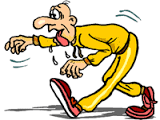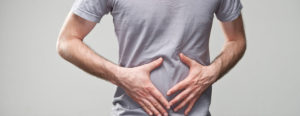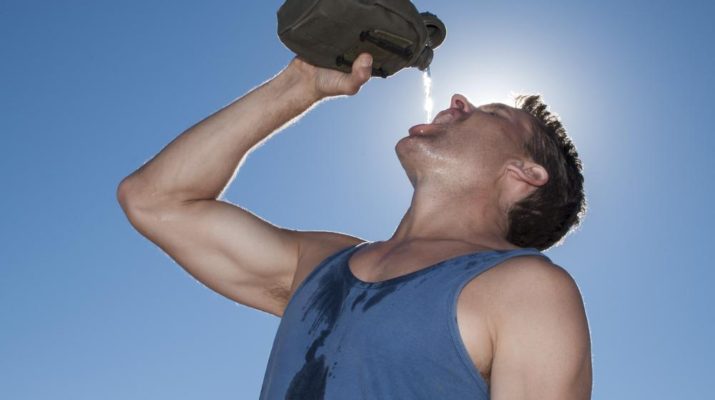The body mostly comprises of water which makes it necessary to ensure that you drink sufficient amount of fluids throughout the day. In addition, water is also a source of many essential minerals that your body needs to function smoothly. The change in lifestyle and busy schedule has, however, resulted in an increase in consumption of sweetened soft drinks that do more harm than good. Depending too much on aerated drinks and less water leads to many ailments such as obesity, type-2 diabetes, and cardiovascular diseases. Drinking less water also leads to the serious problem of dehydration that may be the root cause of many health issues. Dehydration is a silent ailment that starts when the body doesn’t get enough fluids throughout the day.
Table of Contents
- 1 What is Dehydration?
- 2 Causes of Dehydration
- 3 Risks of Dehydration
- 4 Symptoms of Dehydration
- 5 Relation between Water Retention and Dehydration
- 6 How Drinking More Water can Reduce Water Retention?
- 7 Amount of Water you need to Drink
- 8 Precaution of Fluid Intake
- 9 Necessity to Drink Purified Water to Avoid Water Retention
- 10 Last Few Words
What is Dehydration?

Many of us may not be aware of the fact that dehydration is a dangerous medical ailment. Dehydration occurs when you consume less fluids and lose more water as a result of excessive physical activities or exposure to heat. In addition, being busy, sick or lacking safe drinking water when travelling, hiking or camping may also result in dehydration. A slight amount of salt is also released from your body, whenever you lose some amount of water. Hypotonic, hypertonic and isotonic are the three common types of dehydration that may commonly occur. Among these, isotonic is one of the most common types of dehydration that people face.
Causes of Dehydration
There are many reasons that may lead to dehydration. Exposure to heat, excessive sweating, exercising are some of the common causes that lead to water retention. Patients who urinate excessively, vomiting, diarrhoea also leads to excess fluid loss from the body. In addition, skin infections, mouth sores and burns also cause water to escape from your body. Lack of drinking adequate fluid during the day may also lead to dehydration.
Risks of Dehydration
People who don’t consume enough liquid are always at a risk of dehydration. Lack of enough fluids after excessive exercise also increases the risk of dehydration. Some of the complications that you may face as a result of dehydration are:
- Muscle cramps- Painful muscle cramps are not only common in athletes but also people who indulge in strenuous workout. In addition, people who are not very active and drink insufficient amount of fluids also face the problem of muscle cramps as a result of dehydration. Involuntary muscle contraction occurs when the nerves connected to your muscles don’t get sufficient water and sodium leading to hypersensitivity and involuntary contractions.
- Depression: Brain is the prime organ in your body that requires sufficient more fluid than any other part of the body. Brain cells are made up of 85 percent of water. Deficiency of water deficiency in the brain cells cut down the energy supply which leads to lethargy, depression and fatigue.
- Kidney Stones: When you don’t drink sufficient water, urine gets concentrated. The minerals from the urine are accumulated and form cysts which are deposited in the kidney and lead to stones.
- Joint Problem: Dehydration is one of the main reasons of joint problems. Lack of water cause the surface of the cartilage to brush against each other. The cells get worn out and weaken over the time. As a result, new cartilages are naturally formed to replace the damaged one. Without sufficient water intake, however, the nutrients that repair and form new cells are not efficiently transferred. Dehydration delays the repair of damaged cartilages and lead to joint problems.
- Constipation: Food gets processed in the small intestine and the non-essential part of the food gets converted to waste and excreted from the body. The cells of the small intestine start extracting water from the food waste in the intestine when you don’t drink sufficient amount of water resulting in constipation.
- High blood pressure: A common problem that people face as a result of dehydration is hypertension. As the body cells lack water, the pituitary gland secretes a chemical known as vasopressin, which constricts the blood vessels in the dehydrated parts. The constriction of blood vessels leads to hypertension.
- Water Retention: Bloating or water retention is another problem that is caused by dehydration. As a result of dehydration, the build-up fluids in the body remain the body tissues. Water retention causes your entire body or some parts of it to swell up making you uncomfortable.
Among some of the risks mentioned above, many people are not aware of the fact that dehydration is one of the main causes of water retention. Many people face the problem of bloating or water retention that is uncomfortable and distressing.
Symptoms of Dehydration
When individuals don’t drink sufficient water for a long period of time, they develop some symptoms of dehydration. The symptoms and signs of dehydration can vary from being mild to severe. Some of the symptoms that help in detecting dehydration are:
Mild dehydration
• Increased thirst
• Dry or sticky mouth
• Headache
• Muscle cramps
• Dark, yellow urine
• Dry skin
Severe dehydration
• Sunken eyes
• Palpation
• Dizziness
• Breathing rapidly
• Shrivelled and dry skin
• Unconsciousness
• Confusion
• Irritability
Relation between Water Retention and Dehydration

Also called fluid retention or edema, water retention results when there is excess fluid build-up in the body. The entire body or certain parts of the body may swell up depending on the cause of the problem. Edema usually gathers around the ankles and feet, hands, legs and arms. Water retention occurs during the initial stages of dehydration, which is the reason why it is necessary to drink enough water throughout the day. As a result of dehydration, your body reabsorbs the water in the tissues instead of processing the liquid out of the body that leads to swelling and pain.
Water plays an important role in helping the liver convert fat into usable energy. Lack of water leads to accumulation of concentrated fluids and your liver needs to work extra hard. In such a situation, the liver holds on to extra fat that could burn off if you drink enough water. As a result, instead of excreting the water and waste products, the body retains the waste for reuse leading to water retention and bloating.
Learn: How Your Drinking Water Affects Your Thyroid Health
How Drinking More Water can Reduce Water Retention?
When you start drinking more water, your body will start a healthy cycle of thirst, thereby supplying enough water. Drinking plenty of water helps your body and its different processes to start functioning normal. Water not only affects every aspect of our health, but also lubricates the joints and organs. Here are some of the reasons water helps in dealing with the problem of water retention.
• Dissolves Substances
Water is a universal solvent as it has the ability to dissolve different substances. Water also has the ability to freely cross various cell membranes. Water dissolves the nutrients and toxins, which are easily carried across the cell membranes throughout the body. If your body has more substances, you need to drink extra fluids to keep the substances dissolved and maintain safe concentration level. Eating a lot of salty food such as pasta, French fries, bottled salad dressings, instant noodles for instance, not only increases thirst but also makes you feel bloated. This is the reason why you need to drink enough fluid after eating a lot of salty foods.
• Detoxifies your Body
Water is necessary for the kidney to filter blood and produce urine. Dehydration leaves waste in your bloodstream and as a result your liver needs to dispose it. The excessive burden on your liver interrupts its normal functioning such as burning excess fat present in your body. In such a situation, your body retains the fat and water making you feel bloated. Drinking enough water helps in releasing the fat associated with water thereby preventing water retention.
• Proper Distribution of Water
Keeping yourself hydrated ensure that your skin or muscles receive more water and areas such as your abdomen receive less water to prevent bloating. Sufficient supply of water to skin keeps it healthy and helps your muscle function better. Drinking sufficient water also reduces the chances of constipation and reduces the chances of water retention. This can also help in speeding up your weight loss if you are trying hard to shed some extra kilos.
In addition to these measures, some of the other ways to reduce water retention are:
• Eat less salt: Studies found that excess intake of sodium leads to increased water retention.
• Increase your intake of magnesium: Sources of magnesium such as nuts, whole grains, leafy vegetables and dark chocolate are very helpful in reducing water retention.
• Eat potassium rich foods: Potassium decreases sodium level, increases urine production that helps in combating water retention.
• Move around: Walking or moving around can reduce build-up in certain areas such as lower limbs.
• Drink cranberry juice: Cranberry juice has diuretic effects that help in reducing water retention.
Amount of Water you need to Drink
Thirst is a signal that your body needs to be re-hydrated. Though humans can live without food for several days, it becomes impossible to survive without water even for a few days. Even a small percentage of dehydration can affect the normal functioning of your body. Drinking enough water, however, doesn’t imply that you will drink a gallon of water at one go as this will not serve the purpose. When you flood your body with too much water, only a small portion of it is absorbed and the rest of it is passed on to your bladder.
Instead of drinking a lot of water at once, it is advisable to sip water throughout the day. In addition, you can also eat plenty of fresh fruits and vegetables that are filled with water. Though many people may advise you to drink 8 ounces of water per day, the quantity may vary depending on the size, shape and metabolism rate. People who are involved in sports and other strenuous activities need to ensure that they drink more water.
Precaution of Fluid Intake
In certain cases of severe water retention, increase fluid intake may not be helpful in treating water retention and may be dangerous. If a person has undiagnosed kidney failure, for instance, drinking excessive water may do more harm. Drinking excess water in such scenarios may lead to fluid overload, increase your blood pressure and lead to heart disease. Symptoms of severe water retention include abdominal swelling, breathing problem, coughing up blood and pitting that may stay even after pushing down the skin for several seconds. If the water retention doesn’t reduce even after drinking enough water, seek the help of a doctor.
Necessity to Drink Purified Water to Avoid Water Retention
The type of water that you drink also has a lot of impact on water retention. Drinking non-filtered and contaminated water puts your health at the risk from the exposure to toxins and chemicals. The foreign contaminants present in water needs to be filtered by your kidney. Purified water doesn’t have bacteria or viruses, which may affect water retention. When you drink purified water, there is a less risk of allergens coming from the chemicals that are present in tap water. Water purifiers from renowned brands use double purification technology to remove dissolved salts and other contaminants to ensure that you get pure and safe drinking water. The water purifiers also ensure that the essential minerals that your body needs are retained during the filtration process.
Last Few Words
Water retention is a common problem that many people face, however, many of us are unaware of the fact that the problem aggravates as a result of dehydration. Some simple dietary and lifestyle changes can help in a great extent to reduce water retention. Keeping yourself sufficiently hydrated can play a crucial role in reducing the problem of water retention. Dehydration being one of the major reasons of water retention, it is necessary to ensure that you drink enough water to keep yourself hydrated. In most of the cases, drinking enough water is considered one of the top treatments to prevent water retention. However, ensure that you drink purified water that is free of all contaminants and germs to avoid any other health issues.

